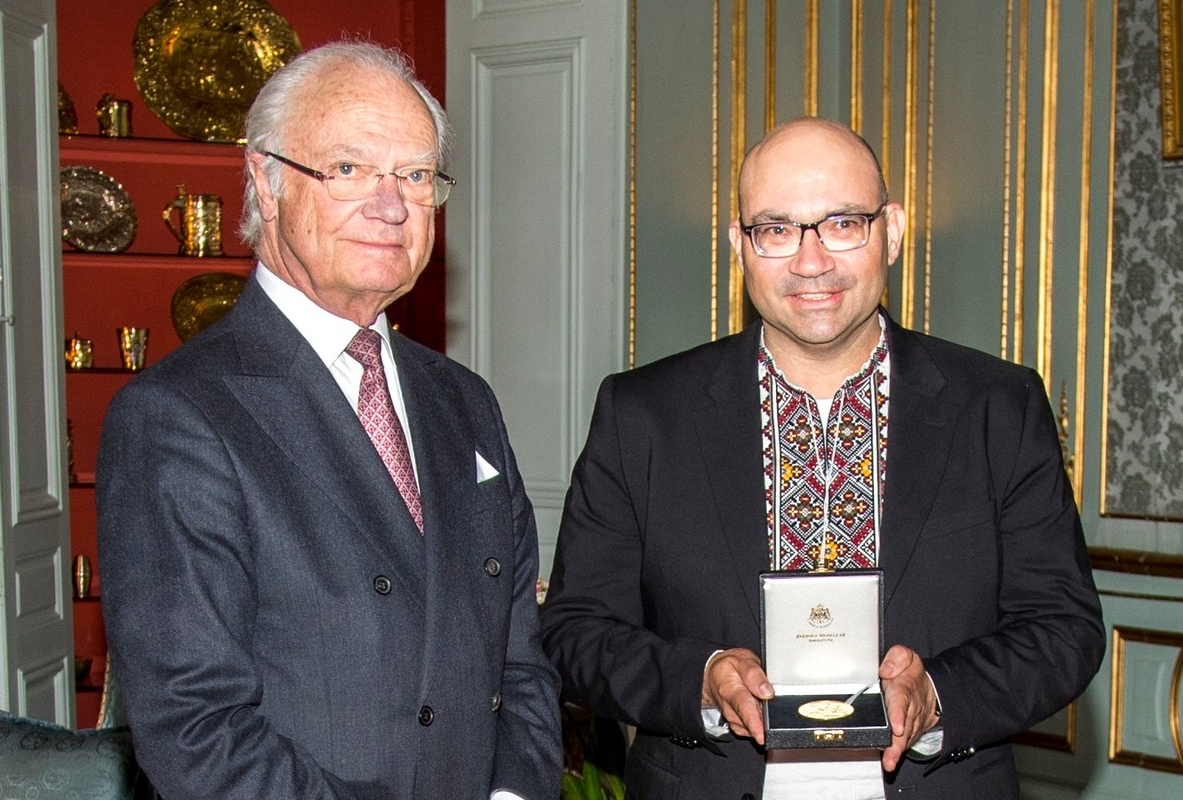On April 22, 2024, I had an award ceremony at the Royal Castle of Sweden. There I received the Vega Medal from Carl Gustav XVI, the king of Sweden and head of the Swedish Society for Anthropology and Geography (SSAG), for my scholarship in human geography, including the subfields of historical geography, the history of Central and Eastern Europe and Eurasia, the history of earth sciences, and critical geography and cartography.
The day of the ceremony began with a morning symposium in my honor at the Swedish Academy of Sciences. I was accompanied to the castle by my partner, a poet-translator from Spanish with a passion for Latin American modernism and women of letters, and Madeleine Bonow and Brian Kuns from the executive board of the SSAG, who nominated me for the accolade. They calmed my nerves!
As I waited for the king, the memories flowed. One was of the stories that East European historians of tsars and emperors get told. I’ve always been curious about head-of-state psychological tactics, how autocratic rulers make people wait. Would it be like that? No, fortunately the king was punctual. I thought about my past trips to Stockholm. I speak some Swedish, and I’ve used Swedish sources. Another memory was of my single, working-class mom in New York—often up at 5:30 am and home by 5pm—who’d come home from her labors with gold star stickers. I coveted those stickers. I wrote a book report and the teacher liked it: gold star. I won a card game with my grandfather: gold star. I managed my swim lesson without drowning: gold star. I won a piano competition: money, plus gold star. She still sends me messages, “Gold star!”
My mom and I have joked about the practice of giving awards and medals. I’ve often wondered, “What’s the purpose to giving so many people all these honors?” Awards bind us to associations and institutions, locally and beyond. Awards grant us platforms for our words. Winners of awards get to sit on future award committees. More free labor! More gatekeeping!
Jokes aside, I do see the purpose. The king’s medal calmed me and gave me positive reinforcement, like my mom. She taught me to teach others to be generous and giving and to find ways to celebrate small success. The US trophy syndrome doesn’t translate well in social democratic Sweden with its Law of Jante, where personal success and excellence can be frowned upon and the good of the whole is prioritized. But on April 22 I read the work of Swedish geographers in admiration. Our symposium was on the “Occupations and the Occupied: Agency, Expertise, and Patronage in Wartime and Postwar Historical Cartographies.”
The king was polished and slick. He talked with us about defense and security and Europe’s future with Sweden and Ukraine. I thanked him for his country’s defense and humanitarian work, and we chatted about the mobilization of Ukrainian troops. We toasted Ukrainians, and each other. It felt hopeful, as I’d hoped it would be. He asked with a sly grin, “Are you a politician?” No, I’m not. But my family in upstate New York were, so we joked about that. After a half-hour of photos and conversation, King Gustav XVI retreated into his castle for his next meeting on Earth Day with the prime minister of Finland.
Ancient rituals, with new maps. History can’t be frozen. A big part of my work deals with how violence makes borders through the history of human terror, error, and manipulation. Through modern geography and after—through all the ranges of sadness and joy, violence and power politics unspoken, the plots and maps of envy and revenge. How maps disappear people. And as heads of state (elected or not) make brute claims to land. When our principles of democracy bend, even as we believe we abide by them. I cover Russia’s full-scale war against Ukraine in all its brutality. As each day passes, I want more Ukrainians to be seen. I tell my super-achiever UT students that I will train them in my “Hidden Lives of Maps” to become better seers and critics of Ukraine in the world.
For this memorable day in Sweden I wore my vyshyvanka, which I bought with a dear friend last summer in Lviv. It was a lovely moment, in full appreciation for my scientific contributions and all the public activism that I do. I got to meet a king, and I’m humbled by this 2024 Vega Medal honor.
Steven Seegel is a professor of Slavic and Eurasian studies at The University of Texas at Austin.


